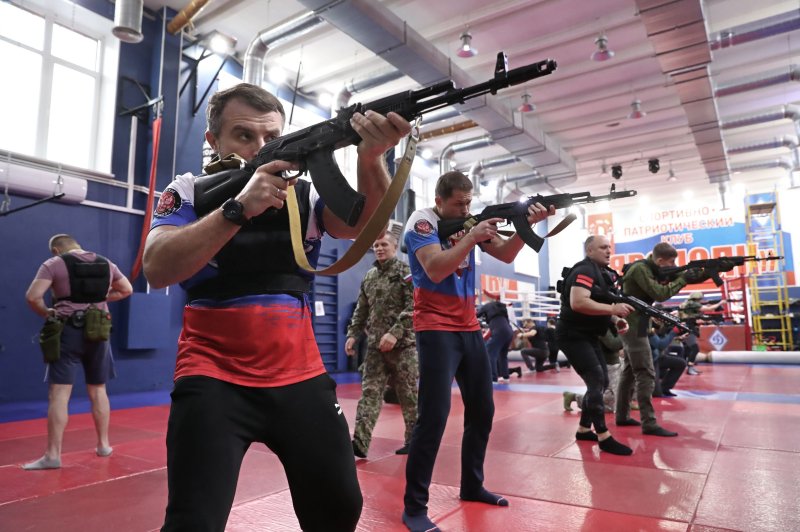Residents of the Moscow region take part in military training at the military-patriotic club 'Yaropolk' in Krasnogorsk, Russia, on Saturday. More than 300,000 reservists and volunteers have been trained over two months of partial mobilization in Russia, Russian Defense Minister Shoigu said. Photo by Maxim Shipenkov/EPA-EFE
Dec. 4 (UPI) -- The British Defense Ministry, which has provided intelligence updates throughout the war in Ukraine, said Sunday that public support for the conflict is "falling significantly" in Russia.
"Recent polling suggests that Russian public support for the 'special military operation' is falling significantly," the British Defense Ministry said in a statement Sunday.
The British Defense Ministry cited data obtained by an independent Russian media outlet, which claimed it had access to data collected by Russia's Federal Protective Service for internal use.
"The data indicated 55% of Russians favor peace talks with Ukraine, with only 25% claiming to support continuing the conflict," the British Defense Ministry said.
"These results are consistent with a separate October 2022 survey where 57% of respondents reported being in favor of talks. In April 2022, around 80% of Russians claimed to support the operation."
British officials said that the war has become "increasingly tangible" for many Russians since Russian President Vladimir Putin ordered a "partial mobilization" of troops in September.
"With Russia unlikely to achieve major battlefield successes in the next several months, maintaining even tacit approval of the war amongst the population is likely to be increasingly difficult for the Kremlin," the British Defense Ministry said.
The news came as Ukrainian President Volodymyr Zelensky ripped a price cap set by the European Union on Russian oil as the first shipment of wheat from the Grain from Ukraine program was delivered for Ethiopia.
"The discussion on price caps, i.e. on limiting the export price of Russian oil, has ended in the world, unfortunately without big decisions," Zelensky said in his nightly address.
"You wouldn't call it a big decision to set such a limit for Russian prices, which is quite comfortable for the budget of a terrorist state."
The plan, which was negotiated by the Group of Seven nations, capped the price of Russian crude oil at $60 per barrel -- which was a compromise between pro-Ukrainian countries such as Poland that had called for a stricter price cap of $30 per barrel and other nations that had called for setting it above $70.
"The logic is obvious: if the price limit for Russian oil is $60 instead of, for example, $30, which Poland and the Baltic countries talked about, then the Russian budget will receive about a hundred billion dollars a year," Zelensky said Saturday.
"This money will go not only to the war and not only to Russia's further sponsoring of other terrorist regimes and organizations. This money will also be used to further destabilize precisely those countries that are now trying to avoid big decisions."
Kremlin spokesman Dmitri Peskov said Saturday that Russia would not accept the price cap on oil, according to a statement from the Russian state media agency TASS.
"We are assessing the situation. Certain preparations for such a cap were made," Peskov said.
"We won't accept the price cap and we will inform you how the work will be organized once the assessment is over."
Zelensky's office said in a statement to CNN on Sunday that the first vessel from the humanitarian program "Grain from Ukraine" has delivered 25,000 tons of wheat bound for the landlocked nation of Ethiopia was delivered to a port in neighboring Djibouti.
The news came as The Guardian reported that a draft resolution is circulating in the United Nations for a "Nuremberg-style tribunal to hold the Russian leadership accountable for crimes of aggression in Ukraine."















